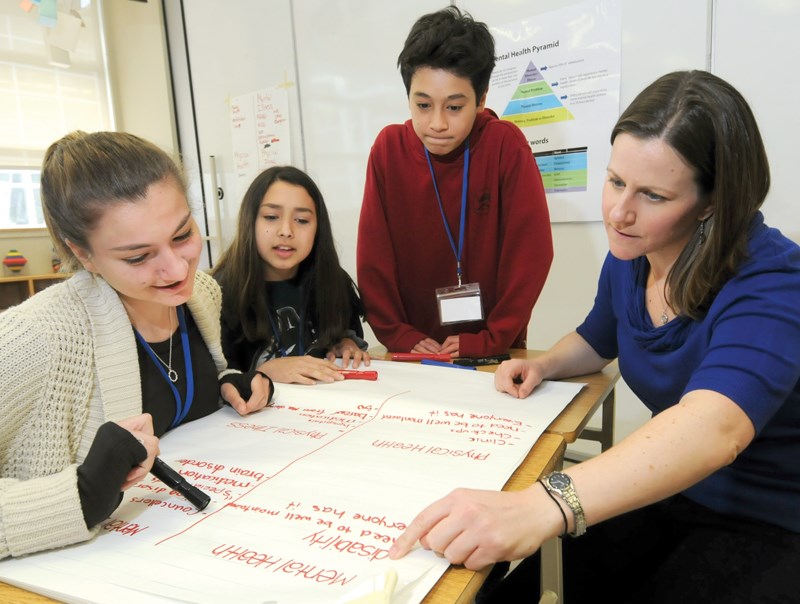The fog of depression, Elizabeth Wurtzel once wrote, is “like a cage without a key.”
Grade 9 Sutherland Secondary students were recently part of a project aiming to lift that fog through a new North Shore-wide mental health literacy program.
The two-day conference is a recent addition to the curriculum and a first in provincial public schools.
After meeting in the gym and raiding the snack table, students listened to an introductory lecture before breaking into smaller groups to discuss the development of the teenage brain, substance abuse, and coping techniques such as mindfulness to combat stress and anxiety.
“We kept (the groups) small on purpose so that the environment would feel a little safer,” notes Kim Jonat, the school’s vice-principal.
The conference is designed to take the shame from mental illness, allowing anxiety and depression to be discussed as openly as diabetes or asthma, Jonat explains.
“We need to get to a place where we can also talk openly about mental illness and not have stigma,” she says.
One of the ways the conference aims to reduce stigma is by putting an emphasis on how harmful language can be – and ways that language can change.
As an example, Jonat notes that in the not-too-distant past homophobic phrases like “that’s so gay” littered high school hallways.
Anecdotally, the conference seems to have made an impression, according to Jonat, who said teachers have reported that terms like “mental distress” seem to have entered the student vocabulary.
“We actually hear them talking about it in the hallways,” she says.
By some estimates, approximately 20 per cent of students have had or will have some form of mental health disorder, according to Jonat.
The idea of instituting the program as a two-day, school-wide conference for the Grade 9 students was calculated to be more impactful than working the material into a class that students would receive in different semesters.
While the courses are part of the physical and health education curriculum, Jonat said they wanted “to be sure that it wasn’t just P.E. teachers delivering it,” she said. Sutherland involved counsellors, administrators and teachers to send the message that mental health crosses all boundaries.
There are manageable but significant traumas – such as the death of a grandparent - that can be dealt with through counselling, Jonat explains. But if a student is exhibiting persistent, extreme feelings or behaviours, such as an inability to get out of bed, a mental health professional is almost certainly needed.
The conference includes two tests: one on the way in and the other on the way out. The tests are then sent to program architect Stan Kutcher of Dalhousie University, who is set to gauge the results for shifts in understanding and attitude.
“It’s an ongoing conversation,” Jonat says.
And while accurate metrics are tough to apply, Jonat suggests the success of the conference may come down to one concept: “Who’s coming forward and how often?”
“It’s not something that’s going to change overnight but the hope is a conference like this will open up the conversation.”
In an effort to aid that conversation, the school recently installed five yellow benches meant to remind students to take a little time out of their day to think about their mental health and the mental health of their peers.
The Friendship Bench initiative was spearheaded by Toronto area marketing professor and public speaker Sam Fiorella after his son, Lucas, died in 2014.
Unbeknownst to his parents, Lucas struggled with depression, according to a press release.
“No parent should find out their child is suffering when it’s too late to do anything about it,” Fiorella stated.
For more information on mental health or to get help, visit cmha.ca or go to kidshelpphone.ca.



